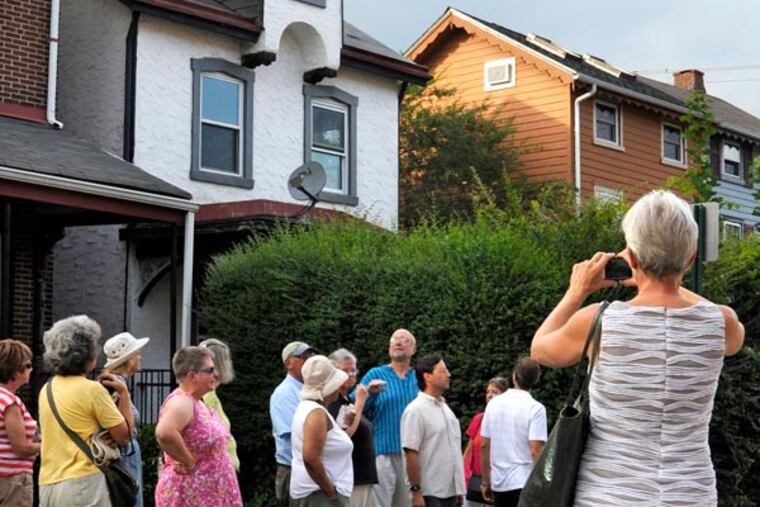Bayard Rustin, local legend linked to the March on Washington
He suffered it in the Warner Theater, where black people were restricted to the balcony, and at the YMCA, where the young and athletic Bayard Rustin couldn't play.

He suffered it in the Warner Theater, where black people were restricted to the balcony, and at the YMCA, where the young and athletic Bayard Rustin couldn't play.
In West Chester, a town that was once a stop on the Underground Railroad, the civil rights legend, named this month to receive the Presidential Medal of Freedom, had his first encounters with inequality.
But the Chester County borough of 18,000 people also was where Rustin learned the Quaker principles that would propel his activism.
Rustin's nonviolent protests as a teen in West Chester would be a precursor to his role as organizer of the historic 1963 March on Washington, whose 50th anniversary is Wednesday.
"He would sit where they told us not to sit. He would go into the restaurant where we couldn't eat ...," said Alice Thomas, 82, who with her husband opened the first black-owned pharmacy in West Chester. "It all started here."
The civil rights giant, who died in 1987, would participate in one of the first Freedom Rides to protest segregation and would counsel the Rev. Dr. Martin Luther King Jr. on the principles of nonviolence. Rustin protested Japanese American internment during World War II and Britain's colonial rule in Africa.
He spent more than two years in jail as a conscientious objector during the war and was on a chain gang after he was arrested on the Freedom Ride.
But it was his arrest on morals charges after being discovered by police in the backseat of a car with two men in California that for years would help relegate Rustin to the background.
He never hid the fact that he was gay. But his sexual orientation, his brief flirtation with communism, and his belief in the Quaker principle of humility kept him out of the movement's spotlight, said John D'Emilio, author of The Lost Prophet: The Life and Times of Bayard Rustin.
Those Quaker principles were taught to him by his grandmother Julia Davis Rustin, who was brought up as a Friend.
She raised Bayard Rustin with her husband and Rustin's grandfather Janifer in a series of small homes in West Chester.
Julia Rustin instilled the principles of "truthfulness, authenticity, and commitment to nonviolence," said Walter Naegele, Rustin's partner and executive director of the Bayard Rustin Fund.
Julia Rustin was a charter member of the local NAACP and hosted black leaders including W.E.B. DuBois, Mary McLeod Bethune, and Paul Robeson, said Marcia A. Taylor, an assistant professor at Delaware State University who is writing a book on Rustin.
The young Bayard Rustin witnessed it all.
He attended the segregated Gay Street School and later West Chester High School, which was integrated because there were not enough black students to fill a separate school. He later studied at what is now Cheyney University.
On Wednesday, about 20 people on a walking tour of Rustin-associated sites sponsored by the Chester County Historical Society stood outside the former Warner Theater, where a teenage Rustin sat in the white section to protest segregation.
"When my mom was a little girl, she had to sit in the balcony," said Cookie Washington, 54, of West Chester.
Washington is a rental manager at the Charles A. Melton Arts and Education Center, founded in West Chester because black residents were not allowed to use the local YMCA.
Rustin spent many days there, returning repeatedly from his home in New York to speak and participate in planning demonstrations to fight discrimination in West Chester.
In 1965, he spoke at a rally to protest segregation in the local school district, said Jim Jones, a West Chester University professor, who conducted the tour.
Later Wednesday, West Chester Mayor Carolyn Comitta, at a borough council meeting, led a 45-minute ceremony honoring Rustin. The ceremony was co-sponsored by the historical society.
Some in the community weren't always so open to claiming Rustin. In 2002, the school district began efforts to name a high school in Rustin's honor, and the move sparked controversy.
Some residents objected because he was gay, once had ties to communism, and declined to serve during World War II. But the school board eventually voted to name the school after him.
Last year, the borough hosted celebrations of Rustin's centennial.
Pharmacy owner Thomas feels there is still an undercurrent of disapproval about Rustin from some in West Chester.
Catherine C. Quillman, a former Inquirer reporter and coauthor with Sarah Wesley of Walking the East End: A Historic African American Community in West Chester, Pennsylvania, which documents the history of a neighborhood where Rustin lived, said some African American residents did not attend the borough hall ceremony because of "bad memories" about the town's history.
But Alfreda Johnson, 88, of West Chester, is entertaining only good thoughts.
Johnson, a cousin of Bayard Rustin's, is thrilled at the recognition her relative is receiving.
"I always think it's so much better when you sing people's praises when they can hear it," Johnson said. "But I think it's wonderful, and I'm very proud of him."